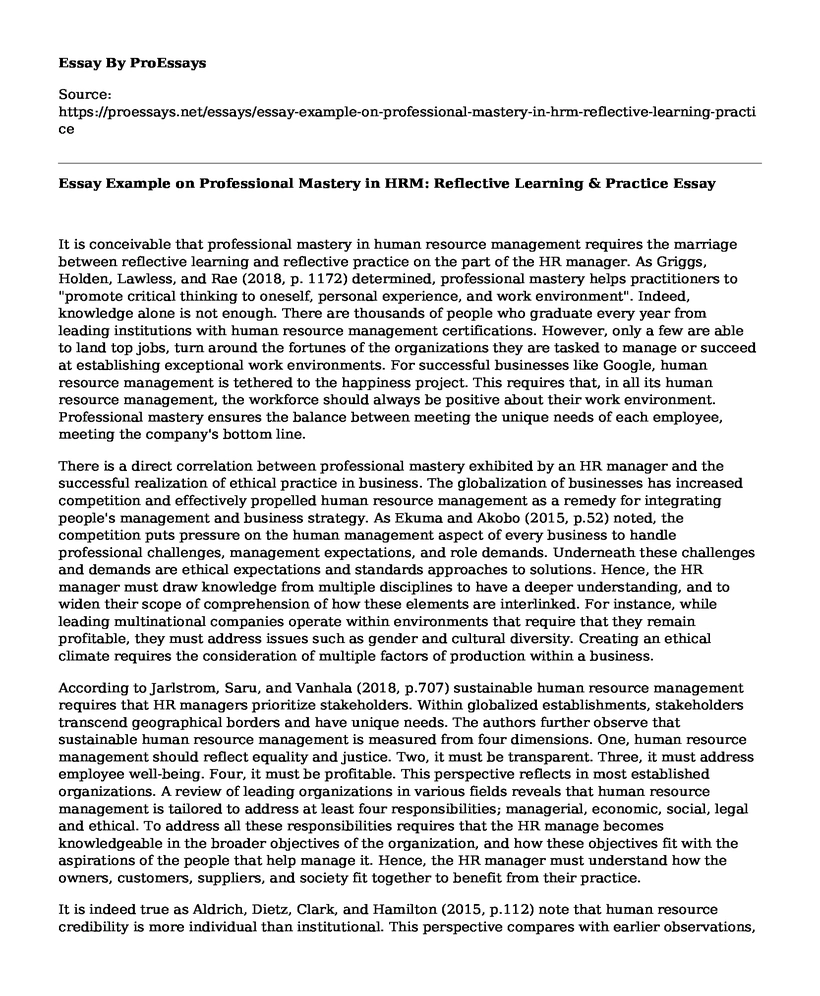It is conceivable that professional mastery in human resource management requires the marriage between reflective learning and reflective practice on the part of the HR manager. As Griggs, Holden, Lawless, and Rae (2018, p. 1172) determined, professional mastery helps practitioners to "promote critical thinking to oneself, personal experience, and work environment". Indeed, knowledge alone is not enough. There are thousands of people who graduate every year from leading institutions with human resource management certifications. However, only a few are able to land top jobs, turn around the fortunes of the organizations they are tasked to manage or succeed at establishing exceptional work environments. For successful businesses like Google, human resource management is tethered to the happiness project. This requires that, in all its human resource management, the workforce should always be positive about their work environment. Professional mastery ensures the balance between meeting the unique needs of each employee, meeting the company's bottom line.
There is a direct correlation between professional mastery exhibited by an HR manager and the successful realization of ethical practice in business. The globalization of businesses has increased competition and effectively propelled human resource management as a remedy for integrating people's management and business strategy. As Ekuma and Akobo (2015, p.52) noted, the competition puts pressure on the human management aspect of every business to handle professional challenges, management expectations, and role demands. Underneath these challenges and demands are ethical expectations and standards approaches to solutions. Hence, the HR manager must draw knowledge from multiple disciplines to have a deeper understanding, and to widen their scope of comprehension of how these elements are interlinked. For instance, while leading multinational companies operate within environments that require that they remain profitable, they must address issues such as gender and cultural diversity. Creating an ethical climate requires the consideration of multiple factors of production within a business.
According to Jarlstrom, Saru, and Vanhala (2018, p.707) sustainable human resource management requires that HR managers prioritize stakeholders. Within globalized establishments, stakeholders transcend geographical borders and have unique needs. The authors further observe that sustainable human resource management is measured from four dimensions. One, human resource management should reflect equality and justice. Two, it must be transparent. Three, it must address employee well-being. Four, it must be profitable. This perspective reflects in most established organizations. A review of leading organizations in various fields reveals that human resource management is tailored to address at least four responsibilities; managerial, economic, social, legal and ethical. To address all these responsibilities requires that the HR manage becomes knowledgeable in the broader objectives of the organization, and how these objectives fit with the aspirations of the people that help manage it. Hence, the HR manager must understand how the owners, customers, suppliers, and society fit together to benefit from their practice.
It is indeed true as Aldrich, Dietz, Clark, and Hamilton (2015, p.112) note that human resource credibility is more individual than institutional. This perspective compares with earlier observations, and consistent with real-world occurrences. Businesses do not pick any person to head their human resource management however successful they are, and irrespective of the level of efficiency in their overall management. Like all other aspects of the management of organizations, human resource management remain a preserve of individuals with the capacity to apply knowledge and understanding of multiple aspects of the business, and how the business relates to its environment. Professional mastery is thus critical for an HR manager if they are to realize the unique element that propels them to success.
References
Aldrich, P., Dietz, G., Clark, T. and Hamilton, P., 2015. Establishing HR professionals' influence and credibility: Lessons from the capital markets and investment banking sector. Human resource management, 54(1), pp.105-130.doi:10.1002/hrm.21626
Ekuma, K. and Akobo, L., 2015. Human resource management ethics and professionals' dilemmas: A review and research agenda. Human Resource Management Review, 5(3), pp.47-57. DOI: 10.5923/j.hrmr.20150503.01
Griggs, V., Holden, R., Lawless, A. and Rae, J., 2018. From reflective learning to reflective practice: assessing transfer. Studies in Higher Education, 43(7), pp.1172-1183. doi: 10.1080/03075079.2016.1232382
Jarlstrom, M., Saru, E. and Vanhala, S., 2018. Sustainable human resource management with the salience of stakeholders: A top management perspective. Journal of Business Ethics, 152(3), pp.703-724. https://doi.org/10.1007/s10551-016-3310-8
Cite this page
Essay Example on Professional Mastery in HRM: Reflective Learning & Practice. (2023, Feb 27). Retrieved from https://proessays.net/essays/essay-example-on-professional-mastery-in-hrm-reflective-learning-practice
If you are the original author of this essay and no longer wish to have it published on the ProEssays website, please click below to request its removal:
- Paper Example on Factors Affecting Student Achievement
- Medical Assistant Externship Report
- Nursing Career Goal: Pursuing a Bachelor's Degree to Help Those in Need - Essay Sample
- Bar Ethics: Conflict of Interest & More - Essay Sample
- Essay Example on OR Violence: Unwanted Abuse & Hostility in the Workplace
- Night Shift Working: Key to Economic Growth? - Essay Sample
- Essay Example on Student Success: Achieving Equality & Inclusion in Higher Education







